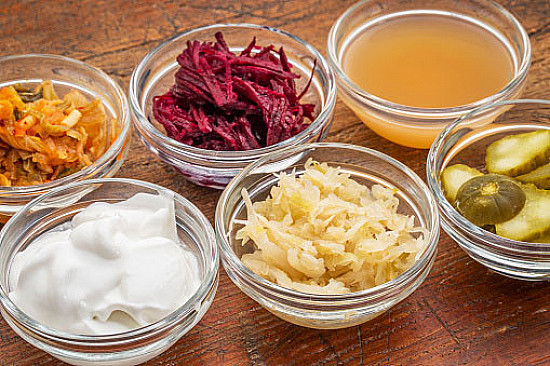The bacterial metabolites produced during fermentation of food can influence gut microbiota. This effect can be both transient and long-term.
Regularly eating fermented foods can help to diversify your gut bacteria. Fermented foods such as sauerkraut, kimchi and kombucha are excellent sources of healthy bacteria. These foods also boost immune function and aid in digestion.
Introduction to Fermented Foods
Generally defined as foods or beverages made with the aid of microorganisms, fermented foods are rich in probiotics and useful metabolites. Examples include pickled cabbage or sauerkraut, yoghurt drink kefir, and sourdough bread (only the lacto-fermented kind). You can find fermented foods in natural food stores and many supermarkets, but they’re also easy to make at home.
The tiny bacteria in our gut have full-body effects, including mental health. Having a diverse gut microbiota may help with digestion and even reduce inflammation.
Studies have shown that a diet rich in fermented foods helps boost the diversity of our gut bacteria, improving digestion and nutrient absorption. This could have a positive impact on certain gastrointestinal conditions, but more research is needed in this area. The good news is that fermented foods offer many other benefits, too, which aren’t related to the digestive tract. Here are some of the other benefits associated with fermented foods:
Probiotics and Gut Microbiota
Eating fermented foods regularly can help keep your gut microbiome healthy. This is important because trillions of bacteria, fungi and other microbes are found in your digestive tract and they influence everything from how well you digest food to your immune system and mood.
In addition to probiotics, fermented foods often contain enzymes and phytochemicals that boost digestive health. They can also help reduce inflammation in the digestive tract and lower your risk of heart disease.
Fermented foods are usually easy to digest, as they are typically made with natural bacteria (such as those in kefir or kombucha) that convert lactose into lactic acid, which is easier for the body to absorb. However, they can be a little hard on your stomach if you consume too much at once, and some may even cause gas and bloating.
To avoid digestive issues, start by slowly introducing fermented foods into your diet. Try starting with one or two types of fermented foods and gradually adding more. Yogurt, kefir, kimchi, sauerkraut and other fermented vegetables or fruits are a great place to start.
Improved Digestive Health
Many digestive issues can be linked to a lack of gut microbes, which is why fermented foods are a great solution. The probiotics in fermented foods can help support gut health by feeding the good bacteria and also by reducing inflammation that can cause GI distress.
Fermented foods have been shown to improve digestion, reduce the risk of certain gastrointestinal conditions and even enhance the absorption of certain nutrients. The bacteria found in fermented foods can also help break down complex food components and improve overall dietary balance.
Try adding a cup of kefir for breakfast, kombucha or sauerkraut for lunch and dinner or eating pickles as a snack. Just be sure to mix it up and eat them in moderation to ensure you get a variety of gut-healthy bacteria. Also, always eat a well-rounded diet and consult with a registered dietitian before making any dietary changes.
Boosting Immune Function
Researchers are just beginning to learn how our gut microbiota influences our immune system. One hypothesis is that the diversity of bacteria in our digestive tract helps to control inflammation, which can lead to diseases like heart disease, obesity and diabetes.
Fermented foods can help replenish the gut’s healthy bacteria. For example, kombucha (fermented black or green tea) contains both probiotics and prebiotics, which can help support the growth of healthy bacteria in the digestive tract.
Another fermented food that is good for the gut is sauerkraut. However, it’s important to eat the kind that hasn’t been pasteurized, as the heat destroys the good bacteria. A popular option is to use it as a topping on hot dogs, but you can also add it to your favorite grain bowl or mix some into your hummus.
Nutrient Enrichment
During fermentation, bacteria break down some of the complex food components and produce biologically active compounds. These include vitamin C, probiotics, antioxidants and a number of other substances with health-promoting properties.
In addition, these microbes help digest and metabolize other nutrients in the foods we consume, making them more easily absorbed by the body. This can be particularly helpful for individuals who have been taking antibiotics, which wipe out both the good and bad bacteria in the gut, resulting in an imbalanced gut microbiota. Fermented foods, such as sauerkraut and kimchi, can restore the diversity of gut bacteria.
Another benefit of fermented foods is their ability to reduce our sugar cravings. The good bacteria in our digestive tract influence how much we want to eat sweets, which may have something to do with the gut microbiome’s interplay with our brain.
Balancing Gut Flora
The gut biome affects everything from mood to bowel movements, weight and immune system function. Feeding it with fermented foods helps balance the good bacteria and improve gut health.
Foods such as sauerkraut, kimchi and tempeh are loaded with probiotics (good bacteria). These grow during the fermentation process. Look for sauerkraut and kimchi that have not been pasteurized, which kills the beneficial microbes. Instead, purchase sauerkraut and kimchi from the refrigerated section of the grocery store or from a local farmer’s market.
Another benefit of fermented foods is that they help bind and remove environmental toxins from the body. A probiotic called lactobacillus, found in fermented cabbage and other fermented vegetables, can bind to heavy metals like lead and mercury and move them out of the body.
Consuming fermented foods can also provide the body with a healthy dose of vitamin B12, calcium, magnesium, zinc and folate. In addition, these foods have been shown to support the immune system and prevent immune overreactions like allergies and autoimmune diseases. A healthy immune system can help prevent the common cold, reduce inflammation and reduce stress levels.
Potential Mental Health Benefits
The gut microbiome has a powerful influence on the brain. For example, fermented foods are a source of tryptophan, an amino acid that’s crucial for the production of serotonin, a neurotransmitter that influences mood. This is why cultures around the world have incorporated fermented foods into their diets.
A recent study found that people who eat more fermented foods have lower perceived stress levels than those who don’t. In fact, the study found that consuming fermented foods reduces pro-inflammatory cytokines and other markers of stress.
Fermented foods are loaded with good bacteria that help balance the bad bacteria in your intestinal tract, boost immunity and improve digestive health. Plus, fermented foods also provide a variety of useful metabolites that have benefits beyond gut health. So, add more fermented foods like sauerkraut, kimchi, miso, kefir and sourdough bread to your diet. Just make sure they have live, active cultures and haven’t been pasteurized. That way, the healthy microbes remain intact and do their job. Start with a serving a day and see how your body responds.
Conclusion
Adding fermented foods to your diet can help you balance the trillions of bacteria that live in your digestive tract. The good bacteria in your gut are essential for proper digestion and to ward off illness.
But a modern diet heavy on processed foods can upset your microbes’ balance. That’s because these foods often contain sugar, salt and unhealthy fats that can wreak havoc on your gut microbiome.
Eating fermented foods can help restore the balance of helpful bacteria, boost your immune system and provide you with important nutrients. So try to include one to two servings of these foods daily, or even more. And always opt for naturally fermented foods, like sauerkraut and kimchi. You can find these in the fridge section of larger supermarkets or at specialist shops, or order a range of probiotic fermented foods delivered to your door from an online retailer. You could also experiment with making your own fermented foods at home, like kefir and kombucha, or by trying out sourdough bread made with a sourdough starter (a culture of yeast and other bacteria). Just make sure these homemade foods aren’t heat treated or pasteurised, which can kill off the beneficial microbes.

